MORINGA
(Moringa oleifera)
Family Name: Moringaceae
Common Name(s): Horse Radish Tree, Drumstick Tree, Sahijan
Part(s) Used: Roots, Seeds and Leaves
Habitat: Found in in semi-arid, tropical and sub-tropical areas, mostly in India.
Properties: anthelmintic; antioxidant; diabetes; anti-inflammatory; tonic; blood purifier
Moringa oleifera is a plant that has been recognized for its health benefits for thousands of years, especially in Ayurvedic and Unani medicinal traditions. It is rich in antioxidants and bioactive plant compounds.
BENEFITS OF MORINGA
- Nutritional PowerhouseFresh Moringa leaves are loaded with incredibly rich nutrients including proteins, amino acids, vitamins, minerals and antioxidants. Just to give you a glimpse of nutrients found in the plant, take a look at this! On a gram for gram basis, fresh Moringa leaves contain:
- 4x more calcium than milk
- 3x more vitamin C than oranges
- 2x more iron than spinach
- 2.5x more protein than yogurt
- The same amount of potassium as bananas
- The same amount of Vitamin A as carrots
It is used in porridge, pastas and breads to increase the nutritious content of meals.
- Rich in Antioxidants
Moringa leaves have been shown to have extremely high antioxidant activity! Quercetin, Chlorogenic acid, Vitamin C and Beta-Carotene are just a few of the big guys found in the leaves. Because of its antioxidant potency, Moringa works to prevent or reduce the effect of chronic conditions such as heart disease, cancer, diabetes, and high blood pressure.
- Blood Sugar
Maintaining healthy blood sugar levels is of vital importance since high blood sugar raises the risk of many serious health problems such as heart diseases. Various studies have shown that Moringa may help lower blood sugar levels.In one study, 30 women took seven grams of Moringa leaf powder every day for three months. This reduced fasting blood sugar levels by 13.5% . Moreover, a small study in six diabetic patients found that adding 50 grams of Moringa leaves to a meal reduced the rise in blood sugar by 21%. These effects are attributed to plant compounds found in Moringa leaves, such as isothiocyanates.
- Inflammation Buster
Inflammation is body’s natural response to infection or injury. It is essential as a protective mechanism, but overtime it can become a major health concern. This inflammation causes many chronic diseases such as heart disease, arthritis, blood pressure, and cancer. Moringa leaves, pods and seeds have all shown to have anti-inflammatory properties.
- Cholesterol Reducer
High levels of cholesterol in the blood have been linked to increased risk of heart diseases. Both animal and human studies have shown that Moringa may have cholesterol-lowering effects.
- Tonic Effects
Moringa leaves helps in boosting energy levels in a natural manner for extended periods of time. It is also found to heal ulcers, restrict tumors, reduce arthritis pain and inflammation and control blood pressure. Daily consumption of Moringa improves body’s natural defense mechanism. It is an immune stimulant and it is often prescribed for AIDS afflicted patients. Consumption of Moringa leaves stimulate metabolism and cell structure of the body. The plant also has several antibacterial properties and hence can be used as a purifier and as a natural detoxifier.
- Kidney Aid
According to research, certain elements found in Moringa roots can cure ovarian cancer, kidney stones and inflammations. It improves the overall kidney function by helping flush out excess calcium, phosphorus, and other minerals.
- Blood Purifier
Moringa has antibacterial properties and hence can be used as a purifier and as a natural detoxifier. Moringa seeds mixed in impure water can help in absorbing all the impurities. Moringa helps in the removal and excretion of toxic build up by attracting toxins from the blood.
- Removes Intestinal Parasites
Consuming leaves of Moringa or drinking its tea helps expel intestinal worms and parasites.
- Increases Breastmilk Production
Eating Moringa leaves is believed to increase a woman’s milk production and are also used often for anemia.
- It Can Balance Hormones
Menstruation, childbirth, menopause can all throw women’s hormones out of whack but Moringa may help. A study published in the Journal of Food and Science Technology found that postmenopausal women who took a combination of Moringa leaf powder and amaranth leaf powder for three months decreased oxidative stress, improved fasting blood glucose and increased hemoglobin levels, which could mean more balanced hormones. Moringa has also been linked to improved thyroid health, which controls hormones related to energy, sleep, and digestion.
- It Improves Digestion
Dried Moringa leaves and leaf powder contains about 30% fiber, most of it insoluble, which is great for your digestion and also reduces your risk of diseases. Moringa is a natural antibiotic and antibacterial and may help inhibit the growth of various pathogens that can upset digestive health. Moringa’s anti-inflammatory properties have been shown to help with digestive disorders, like ulcerative colitis, as well as improve gut bacteria.
HOW TO USE
Moringa is available fresh, as dried leaves and leaf powder. Fresh Moringa is easily available in South Asia but not so much in Western world. However, dried Moringa is easy to find. Moringa powder has a mild flavor with a slightly earthy taste. It can be added to everything from green smoothies to oatmeal and hummus. It can also be sprinkled into soups and salads, baked into muffins and bread or mixed into your energy bars.
Dried moringa leaves can also be brewed for a caffeine-free tea which tastes great with flower honey.
CONTRAINDICATIONS
- No side effects of Moringa leaves have been reported. Hence, it can be safely consumed by children and adults.
- The thickened root of the plant has been used as horseradish in the past. This practice is not recommended since the root contains alkaloids, which can prove fatal on ingestion.
Tags: anthelmintic; antioxidant; diabetes; anti-inflammatory; tonic; blood purifier; cholesterol; breast milk; blood purifier; kidneys; nutritious

